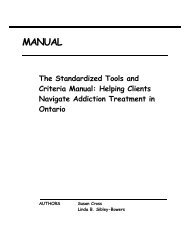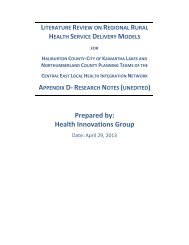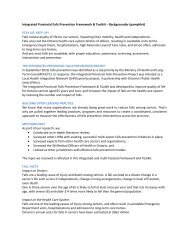CDE Appendix 1 Literature Review - Central East Local Health ...
CDE Appendix 1 Literature Review - Central East Local Health ...
CDE Appendix 1 Literature Review - Central East Local Health ...
Create successful ePaper yourself
Turn your PDF publications into a flip-book with our unique Google optimized e-Paper software.
The Culture, Diversity and Equity Project: <strong>Literature</strong> <strong>Review</strong><br />
4. Strengthen knowledge development and exchange activities (develop indicators to measure the impact of<br />
health disparities; continue to support research; improve health information systems; share evidence on<br />
health disparities).<br />
The adoption and promotion of a ‘10 year plan to strengthen health care’ at the (2004) First Minister’s Meeting<br />
on the Future of <strong>Health</strong> Care. First Ministers at this meeting agreed on an action plan based on the following<br />
principles:<br />
• Universality, accessibility, portability, comprehensiveness, and public administration;<br />
• Access to medically necessary health services based on need, not ability to pay;<br />
• Reforms focused on the needs of patients to ensure that all canadians have access to the health care services<br />
they need, when they need them;<br />
• Collaboration between all governments, working together in common purpose to meet the evolving health<br />
care needs of canadians;<br />
• Advancement through the sharing of best practices;<br />
• Continued accountability and provision of information to make progress transparent to citizens; and<br />
• Jurisdictional flexibility.<br />
Many of the principles affirmed in this 10 year plan synchronize with, and are fundamentally informed by,<br />
principles of equity in health status and health care. The 2004 First Minister’s Meeting also featured a special<br />
meeting with Aboriginal leaders which resulted in the development of specific measures to address disparities in the<br />
health status of Aboriginal peoples:<br />
• The Quebec Public <strong>Health</strong> Act which requires all ministries and agencies to consult with the Ministry of<br />
<strong>Health</strong> and Social Services when they are formulating policies that could have an impact on health (see PHAC<br />
& WHO 2008 Report)<br />
• The provincial Ontario Ministry of <strong>Health</strong> and Long-Term Care’s (MOHLTC) recent development of a tenyear<br />
strategic vision and plan for Ontario’s health care system which is expected to feature equity as a<br />
prominent direction (Lettner, 2008a; Gardner, 2008a). The fact that the Ministry has already established a<br />
health equity unit to coordinate policy activities on health equity is particularly encouraging in this respect. In<br />
light of such developments, Lettner suggests that “the new <strong>Local</strong> <strong>Health</strong> Integration Networks (LHINs) will<br />
need to operationalize health equity as part of their mandate in response to the new provincial strategy” (2008a).<br />
• The policy developments and strategic commitments made by various <strong>Local</strong> <strong>Health</strong> Integrated Networks at the<br />
regional level, in particular the Toronto <strong>Central</strong> LHIN’s successful August 28, 2007 motion to insert health<br />
equity and diversity performance indicators into the CEO's Annual Performance Plan and requirement, for<br />
all 18 hospitals in the Toronto <strong>Central</strong> LHIN, to provide action plans.<br />
• The formation of the GTA Diversity and LHINs Working group, specifically addressing diversity and equity<br />
issues in the LHINs context.<br />
Limitations and Challenges<br />
Some of the challenges and limitations of Canadian health equity policy developments are discussed below.<br />
• There is a substantial discrepancy between official Canadian governmental avowed commitments to health<br />
equity, health promotion and population health and government policy and action on such matters. The<br />
Canadian Population <strong>Health</strong> Initiative in this respect observes:<br />
Canada has led the world in understanding health promotion and population health …However in recent years,<br />
as the costs and delivery of health care has dominated the public dialogue, there has been inadequate policy<br />
development reflecting these understandings. In fact, Canada has fallen behind countries such as the United<br />
Kingdom and Sweden and even some jurisdictions in the United States in applying the population health<br />
knowledge base that has been largely developed in Canada (2002, p.1).<br />
This observation is reiterated by Raphael & Bryant (2006), Williamson et al. (2003), Williamson (2001), and<br />
Sutcliffe et al. (1997).<br />
64

















